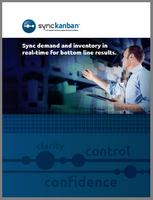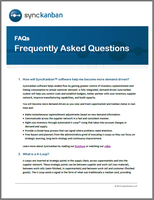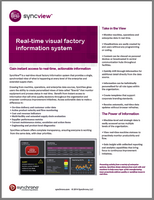Blog
-

Kanban Series White Paper: Gain a Competitive Advantage for Bottom-Line Results
Kanban Series White Paper: Gain a Competitive Advantage for Bottom-Line Results In this white paper, we look at the competitive edge Demand-Driven Manufacturers gain by not only being devoted to driving flow and eliminating waste, but also in enabling their organizations to become best-in-class by using Pull and eKanban software technology. These manufacturers provide valuable opportunities…
-

Thought Leadership: 2018 Top Ten Trends in Modern Demand-Driven Manufacturing
Thought Leadership: 2018 Top Ten Trends in Modern Demand-Driven Manufacturing With all signals pointing toward a good year, manufacturers have a decision to make. They can enjoy the strong economy while it lasts or look to the future and invest in technologies that will help them build a stronger organization that can prosper through economic…
-

Brochure: SyncKanban® eKanban Software
Brochure: SyncKanban® eKanban Software eKanban Pull-Based Inventory Replenishment Software for Supply Chain Execution and Collaboration SyncKanban® eKanban software synchronizes demand and inventory by monitoring consumption and replenishment across every facet of the manufacturing cycle in real-time. Simple to use, yet sophisticated enough to handle highly complex manufacturing environments, SyncKanban® helps right-size your inventory for bottom-line results.
-

FAQs: SyncKanban® Software
FAQs: SyncKanban® Software eKanban Pull-Based Inventory Replenishment Software for Supply Chain Execution and Collaboration SyncKanban® manufacturing eKanban software provides continuously refreshed, powerful information to right-size inventory levels and maximize workflow. It monitors consumption and replenishment across every facet of the manufacturing cycle – from suppliers to manufacturing to transfer kanbans – healing the performance problems that come…
-

Product Information Sheet: SyncView® Software
Product Information Sheet: SyncView® Software Real-time, self-service manufacturing visualization and communication system SyncView® is a real-time, self-service manufacturing visualization system that gives everyone the ability to monitor equipment and process status as it happens – from wherever they are. SyncView® software connects to any data source to visualize data the way you want to see it, giving…
-

FAQs: SyncView® Software
FAQs: SyncView® Software Real-time manufacturing visualization and communication system SyncView® is a real-time manufacturing visualization and communication system that provides a single, synchronized view of what is happening at every level of the enterprise and extended supply chain. Drawing from machine, operations, and enterprise data sources, SyncView® gives users the ability to create personalized views of data called…
